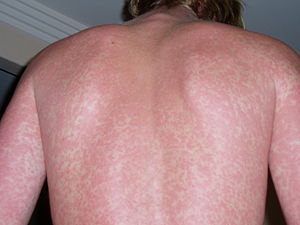Rash
| Rash | |
|---|---|
 |
|
| A diffuse rash on the back of a male | |
| Classification and external resources | |
| Specialty | Dermatology |
| ICD-10 | R21 |
| ICD-9-CM | 782.1 |
| DiseasesDB | 25831 |
| MedlinePlus | 003220 |
| MeSH | D005076 |
A rash is a change of the skin which affects its color, appearance, or .
A rash may be localized in one part of the body, or affect all the skin. Rashes may cause the skin to change color, itch, become warm, bumpy, chapped, dry, cracked or blistered, swell, and may be painful. The causes, and therefore treatments for rashes, vary widely. Diagnosis must take into account such things as the appearance of the rash, other symptoms, what the patient may have been exposed to, occupation, and occurrence in family members. Rash can last 5 to 20 days, the diagnosis may confirm any number of conditions. The presence of a rash may aid diagnosis; associated signs and symptoms are diagnostic of certain diseases. For example, the rash in measles is an erythematous, morbilliform, maculopapular rash that begins a few days after the fever starts. It classically starts at the head, and spreads downwards.
Common causes of rashes include:
Uncommon causes:
The causes of a rash are numerous, which may make the evaluation of a rash extremely difficult. An accurate evaluation by a provider may only be made in the context of a thorough history (What medication is the patient taking? What is the patient's occupation? Where has the patient been?) and complete physical examination.
Points to note in the examination include:
A patch test may be ordered, for diagnostic purposes.
Treatment differs according to what rash a patient has been diagnosed with. Common rashes can be easily remedied using steroid topical creams (such as hydrocortisone) or non-steroidal treatments. Many of the medications are available over the counter in the United States.
The problem with steroid topical creams i.e. hydrocortisone; is their inability to penetrate the skin through absorption and therefore not be effective in clearing up the affected area, thus rendering the hydrocortisone almost completely ineffective in all except the most mild of cases.
...
Wikipedia
